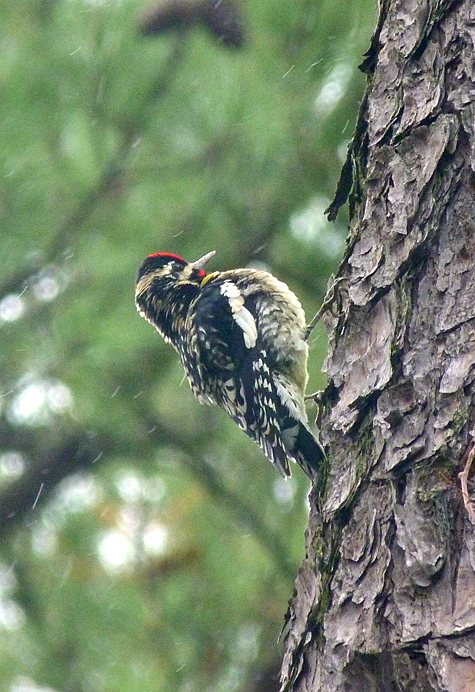You may have read about Yellow-bellied Sapsuckers here before. Type in sapsucker in the search box on the top right and you’ll see many posts which contain the word sapsucker (<- that’s just one). Here’s two – more. Why do I mention sapsucker so often? Read on (and read the three links above too).
Sapsuckers are winter visitors here in the Piedmont of North Carolina. We start seeing them in October and most are gone by April. They go about their business quietly, traveling from tree to tree drilling nice neat little holes, or wells, in the trunks that will eventually fill up with sap in which to suck. The sap also attracts insects and other birds.

Sapsuckers don’t make a lot of noise like the other woodpeckers in these parts, the red-bellied, hairy, downy, pileated, flickers, and even red-headed woodpeckers. Not that any of those woodpeckers are particularly noisy, but they do tend to rattle off on occasion. And they do, in the spring, feel the need to search out the most resonant piece of tree limb, trunk, or rain gutter in which to drum out a message announcing, “I’M HERE!”
No, the sapsucker may speak up now and then, but its call, at least on its wintering grounds, is a rather soft mewing sound. Don’t get me wrong, I get excited each spring when I hear the other woodpeckers trying to out compete one another with their loud drumming or the loud high pitched proclamations Downy Woodpeckers make as they fly in to the bird feeder.
Sapsuckers seem to be more secretive, more mysterious. We don’t see or hear how they behave on their breeding grounds. We only see them at their most quiet of times, when their most urgent concern is making it through the winter, finding a source of food and staying out of trouble.
Watch out sapsucker, while you quietly drill your little wells in the trunks of trees. Watch out, while you sip your sap and pick off insects at your wells. Watch out for those feral cats and Sharp-shinned and Cooper’s Hawks that are trying to make it through the winter too, by picking off you.